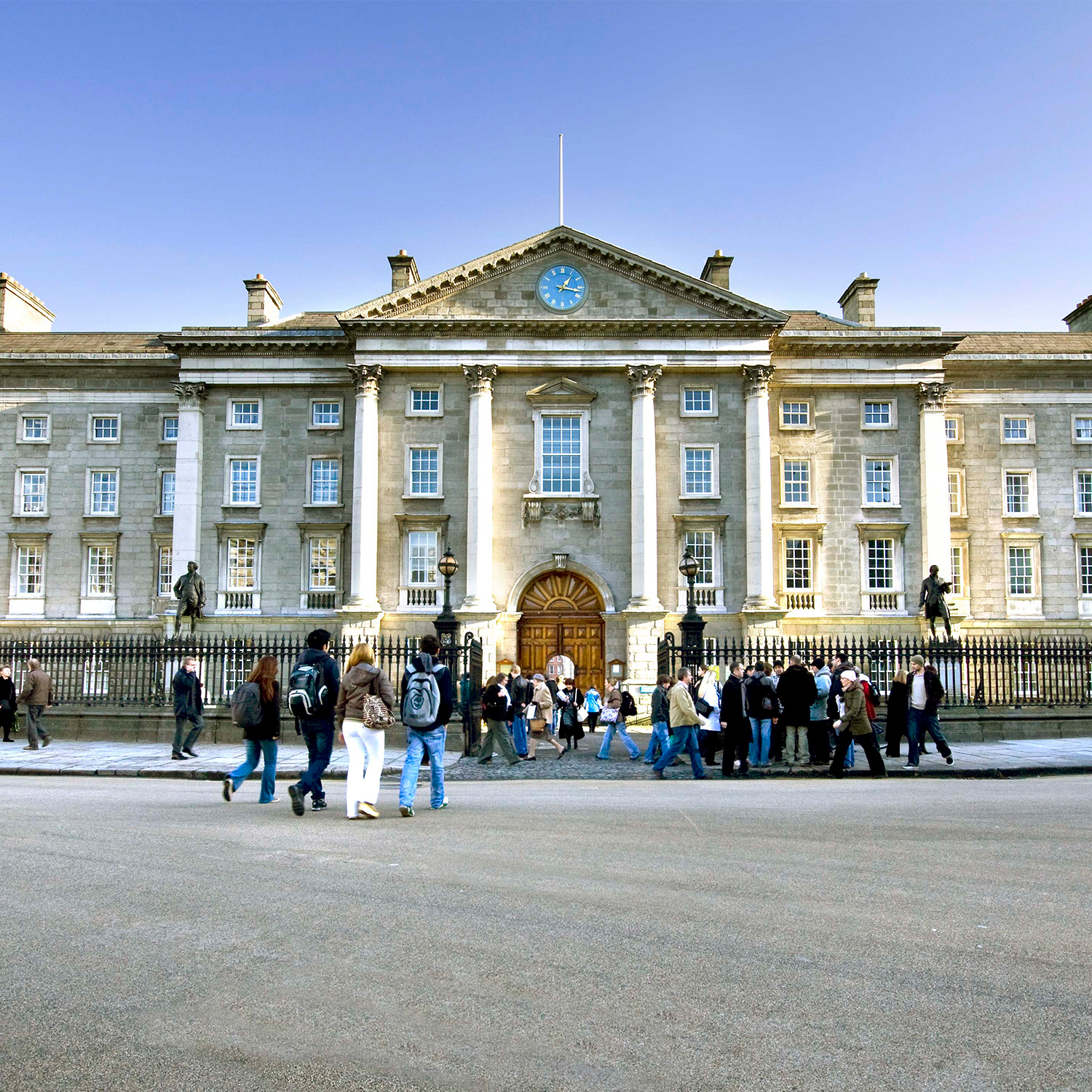France
France
Welcome to Trinity College Dublin, Ireland’s leading university. Prospective students from France can discover more about Trinity including contacts and equivalent entry qualifications for undergraduate and postgraduate study below. You can also register your interest to find out more.
Undergraduate Requirements
Trinity is delighted to accept students who have completed the below qualifications from France:
Recognised School Leaving Qualifications
- Diplôme du Baccalauréat Général
- Baccalauréat français international/Option Internationale du Baccalauréat
Minimum Entry Requirements
Overall 10 with a minimum of 6 distinct recognised subjects passed to include English, Mathematics and another language.
English Language Competence:
Please see list of acceptable English Language Qualifications.
Specific Course Requirements
This table shows what is required in terms of the French Examinations to meet specific course requirements. See the full details of specific course requirements.
Subject Grade Comparison |
|||||
LC Higher |
Coefficient ≤16 |
Coefficient ≥ 16 |
LC Ordinary |
Coefficient ≤16 |
Coefficient ≥16 |
H1 |
18 |
16 |
O1 |
14 |
12 |
H2 |
17 |
15 |
O2 |
13 |
11 |
H3 |
16 |
14 |
O3 |
13 |
11 |
H4 |
15 |
13 |
O4 |
12 |
10 |
H5 |
14 |
12 |
O5 |
12 |
10 |
H6 |
13 |
11 |
O6 |
12 |
10 |
H7 |
12 |
10 |
|
|
|
Indicative Points Equivalence
As a guideline it is anticipated that the indicative equivalence will be calculated as follows, provided adequate distinct recognised subjects are presented:
Points Conversion Table |
|
Moyenne sur 20 |
IPS |
20 |
600 |
19 |
599 |
18 |
598 |
17 |
570 |
16 |
541 |
15 |
498 |
14 |
454 |
13 |
411 |
12 |
368 |
11 |
309 |
10 |
250 |
Single sitting
It is normal for some subjects to be examined in the year prior to the final examination. This is acceptable for points calculation purposes provided the examined subjects cover only 2 consecutive years.
Bonus points for maths: 25 additional points will be awarded for Mathematics grade 11 or better with a minimum coefficient of 16 in the Epreuves Terminales provided mathematics is included in the overall awarded used for points calculation.
Students who have not completed the above qualifications can apply using one of the international examinations recognized by Trinity.
In addition, to qualify for admission to a degree course at the University you must:
- Meet the minimum matriculation requirements (pass grades in English, Mathematics, a language other than English, and a full set of valid subjects for your examination system)
- Display a high level of competence in the English language in one of the examination systems recognised by Trinity College Dublin.
Details on accepted English proficiencies are available on our Admission Requirements page
- Satisfy course specific requirements. Some courses will have additional requirements and restrictions for admission.
They will be detailed on the relevant course page at and on our Admission Requirements page
- Meet competitive standards for admission to the course.
Please note that posted scores are minimum entrance requirements only and do not guarantee admission. Where places are competitive, a student must have excellent examination results to qualify for a place on their preferred course.
These standards are indicative only and final assessment will be made by Trinity's Academic Registry.
Important note on your application
Applicants from your country will normally be defined by Trinity as EU applicants; this is based on residency rather than nationality.
Your EU/Non-EU status is an important part of your application and it is your responsibility to determine your correct status before making an application, as the method of application and requirements will differ.
Determining EU/Non-EU status (Undergraduate)
Determining EU/Non-EU Status (Postgraduate)
There are many different ways to come to University and Trinity encourages applicants from all backgrounds and circumstances to apply. For more information on alternative paths to Trinity, such as advanced entry transfers,
please see our guide to non-standard applications here
Postgraduate Entry Requirements
Postgraduate work in Trinity is academically challenging and the University has high academic entry requirements.
Applicants will need to:
• hold at least a 2.1 honors degree from an Irish university or equivalent result from a university in another country.
Determining EU/Non-EU Status (Postgraduate) The fees you will be expected to pay to attend Trinity College Dublin are determined by a number of factors. For more information on how to determine your course fees, and methods of payment, please see our detailed information on Fees and Finances. Undergraduate Fees and Finances Postgraduate Fees and Finances For more information on scholarship, funding and grant opportunities, please see below. General Undergraduate Scholarships and Funding General Postgraduate Scholarships and Funding Do I need a Visa to come to Ireland to study at Trinity? Our EU Recruitment Team is here to help you find out more about Trinity College Dublin, through on campus Open Days, visits to Trinity with your school, assistance for your guidance counsellors and more.
For more information please see Visit Our Campus.
If you have further questions about the application process you can contact the Applications and Admissions Team in Trinity’s Academic Registry
Email: Academic Registry - AskTCD
Phone +353 1 896 4500
• display a high level of competence in the English language in one of the examination systems recognised by Trinity College Dublin. Details on accepted English proficiencies are available on our Admission Requirements page
Some courses may require higher standards or require you to take further tests or attend an interview. More detailed requirements for each course are listed on the relevant course page
If you have questions about the specifics of the admission requirements for a given course, or about the course itself, you should contract the course coordinator directly using the contact information available on the courses page.Fees, Funding, Scholarships
Trinity College Dublin offers a number of scholarship opportunities for prospective and current students interested in study or research at Ireland's leading university. Since its foundation in 1592, Trinity College Dublin has sought to assist students of limited means and reward academic achievement. Students are always encouraged to explore external funding options in their home countries.Visas
EU/EEA/UK/Swiss students do not require a visa to study in Ireland. If you are unsure about whether you are an EU/EAA national, see here for a list of all EU/EAA countries.
For general information on visas and immigration please visit our Visa Information section.
Meet us in your country
Contact Details
Contact us
Student Testimonials
-
 Ellen O’RourkeEuropean Studies
Ellen O’RourkeEuropean Studies
IrelandTrinity’s historic campus in the city centre as well as its international reputation were the two major factors in my decision to study here. There is so much more to Trinity than just what goes on inside the classroom. There’s hundreds of student led societies and over 50 sports clubs so there really is something for everyone. I would encourage everyone to get involved and find their passion. It’s here that you build friendships, develop skills and gain important experience.
-
 Léa DulyInternational and European Business Law (LL.M.)
Léa DulyInternational and European Business Law (LL.M.)
FranceHaving undertaken my Erasmus year at Trinity, I did not imagine myself studying anywhere other than the School of Law and undertaking the LL.M (International and European Business Law). This LL.M programme gave me the opportunity to specialise in the legal fields in which I had significant interest in and write a dissertation on a related legal topic, with clear and helpful advice from my dissertation supervisor. During the year, I had the opportunity to meet legal professionals, which gave me a chance to really consider the direction I would like to follow in my future legal profession.
-
 Pauline GreinierLaws LL.M.
Pauline GreinierLaws LL.M.
FranceAs a postgraduate law student from Paris, I previously attended Trinity as an Erasmus exchange student in 2019-2020 and had such a great experience there; I really wanted to come back. It's a great university with an amazing reputation for its law courses. In addition, it has a beautiful campus located in the heart of a vibrant European capital. What I really enjoyed about studying at Trinity was being able to meet so many other students from everywhere in the world and the active campus life with a lot of events to attend every week.
-
 Céline L HermiteInternational and Comparative Law LL.M.
Céline L HermiteInternational and Comparative Law LL.M.
FranceI’m currently pursuing an International and Comparative Law LL.M. at Trinity as a postgraduate student. Trinity is one of the best English-speaking universities in Europe and the best in Ireland. Knowing that it is composed of a large integrated international community is reassuring as a European student. I like the diversity of students, both in terms of cultural and geographical background and in terms of professional/academic experience. It is very enriching to be with such a multicultural community!







